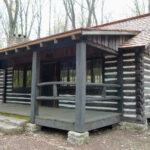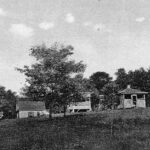A serial fiction story for your enjoyment
written by James Rada, Jr.
6: Escape
Brian Johnson waited, hidden in the treeline around President Franklin Roosevelt’s secret mountain retreat. The night was quiet, but the area around the one-story home was still well lit. He could also see two guards patrolling the perimeter of the house.
He needed to move soon. Every minute he waited was another minute someone might find the Marine he had attacked on his way here and another minute closer to sunrise.
He had the element of surprise on his side right now, but he would only have one chance to achieve this victory on behalf of the Fuhrer.
Once he accomplished that goal, he would need to make his getaway. It would be too dangerous to return to the OSS training camp bordering this retreat. Once Brian had assassinated the president, the camp would go on alert. They would realize he was missing. He would be a hunted man from that point.
No, he would need to steal a Jeep and drive as far away from here as he could, even though he didn’t know where he was. He had been brought here to train with the OSS in secret. He would just have to find a road and head east. If he could reach the coast, he was sure he could board a ship.
Now that he was in place, Brian wasn’t sure what to do. This had been more a mission of opportunity rather than one he had been assigned. He was closer to the President of the United States than any other German agent had got.
However, close only counted with horseshoes and hand grenades, and he had neither. Not that either would have helped him right now.
He had to get closer to the house, identify the president, and kill him. It sounded easy in his head, but looking at the house and the guards, Brian knew he might have taken on a suicide mission or worse yet, he might fail.
One thing he had learned in the OSS camp was that the best way to not be detected was to act like you belonged there. Acting suspiciously drew attention.
Brian took a deep breath and stood up. He looked at his fatigues. They had no identification on them and wouldn’t hold up to scrutiny if one of the guards got too close.
He had been timing in his head how long it took the guards to make their rounds. He waited until they passed the closest point to the house where he was. Then he walked out of the trees and across the yard to the side of the house.
He glanced in one window and saw the kitchen was empty. Brian moved to the next window and saw a den. He saw a man with thin hair and spectacles sitting at a desk writing something.
It was President Roosevelt!
Brian raised the pistol from the guard he had attacked. He smashed it against the glass in the window and fired at the president. He sat upright suddenly and then fell over to the side.
Brian had hit him!
He didn’t have time to try to fire another shot at him, though. He heard shouting. The guards would be running this way.
Brian started running around the side of the house. “The president’s been shot!” he shouted. He wanted to take the attention off him and get the guards more worried about the president.
Brian saw guards running in his direction and he waved toward the house. “He’s in there. The president’s been shot. He needs help.”
The guards veered off toward the house. Brian saw a car parked beside the house and ran to it. He jumped into the driver’s seat. As he expected, the keys were in the ignition because many people might need to use the vehicles on the property and didn’t need to have to go searching for keys.
He started the engine, turned on the headlights, and followed the driveway. He kept following it when it reached a road that allowed him to speed up.
As he sped down the road, Brian’s mind raced with adrenaline and fear. Brian had just assassinated the President of the United States. He might have changed the course of the war. He wanted to be around to see how his heroic action would play out, but he was fleeing into the unknown. He had no idea where he was going, but he knew he had to keep moving and stay ahead of the authorities.
Brian saw a swing arm blocking the road ahead of him. He sped up and crashed through it. A Marine ran outside from a small shack and fired a rifle at him.
The road ahead of him twisted and turned through the mountains, and Brian’s driving skills were put to the test. He headed downhill, pushing the sedan to its limit, taking curves at high speeds and narrowly avoiding crashes. His heart raced, and his hands were slick with sweat on the steering wheel.
He drove as fast as he could, trying to put as much distance between himself and the Marines who would surely be following.
As he drove, his mind raced with thoughts of where to go next. He needed to get as far away as possible, but he couldn’t just drive aimlessly. He needed a plan, a destination, but first, he needed to discover where he was.
The slope of the road leveled out and suddenly, he was on the outskirts of a town. It wasn’t large, but there were other cars, homes, and people. All of which could help him escape.
Brian parked the car and got out. Because of how late it was, the streets were empty of people. He ran between two homes and headed down an alley. He needed to find a phone and call his contact to see what he should do now, but the town was too small for anyone to be up this late.
Brian could steal another car, but he still did not know where he was.
He heard a car race by on the main road. The Marines must have followed him into town. They would search it, trying to find him.
He saw a small office for a doctor. Surely, a doctor would have a phone.
Brian looked around and saw the street was empty. He used his elbow to knock a glass pane out of the front door. Then he reached in and opened the door. He didn’t turn on the lights, but there was enough light from the streetlights to make out objects.
He found a phone on the desk and sat down on the floor, so it wouldn’t be obvious anyone was in the office.
Brian lifted the receiver and jiggled the button to alert the operator.
“Okay, doc,” the operator said. “Is there an emergency?”
Brian thought quickly. “Yes, he my father is sick. He’s getting him ready to go to the hospital, but he wanted me to call Dpont 4397.”
“That’s in Washington, D.C.”
“Yes, we were driving there when my father fell ill. I need to let my family know what happened.”
“One moment, please. I will try to connect you, but it is late. Who should I say is calling?”
“Brian Johnson.”
“One moment, please.”
Brian heard silence.
He waited, silently urging his contact to pick up. He wanted to turn a light on and try to find something that would say where he was, but he couldn’t risk the light attracting attention.
“I am not getting an answer,” the operator said. “Would you like me to keep trying?”
Brian clenched his fist and pounded it on the floor. “Yes, yes.”
Suddenly, the front door crashed open, followed a moment later by a door in the back. Marines rushed into the office, shining their flashlights all around until they focused on him.
How had they found him?
“Hands above your head and slowly stand up.”
Someone turned the lights in the office on.
Brian blinked in the light. When he could see clearly, he saw Lt. Harcourt standing in front of him.
Brian slowly stood up, smiling.
Lt. Harcourt raised an eyebrow. “I don’t see why you’re so happy.”
“You may have caught me, but I killed the president.”
Now Harcourt smiled. “No, you didn’t.”
“Don’t lie. I saw him fall.”
“You saw an actor fall, and your pistol only had blanks.”
“No…”
“We started suspecting you were up to something days ago, and we took precautions. I would guess the president is just waiting to hear if we were successful.”
“At what?”
“We let you get away. We wanted to wrap up as much of your network as we could. We had someone with the operator. She never placed your call, but we called our people in Washington and sent them out to the address that goes with the phone number you provided us. Whoever is in that home now should be getting a rude awakening right now.”
Harcourt reached out and turned Brian around. Then he put handcuffs on his hand behind his back.
“I don’t know how you thought you’d get away with something like that among the best-trained spies and saboteurs in the world.”
“If you’re so good, why’d you recruit me?” Brian asked.
Harcourt shrugged and then grinned. “Well, nobody’s perfect.”
~ The End ~





